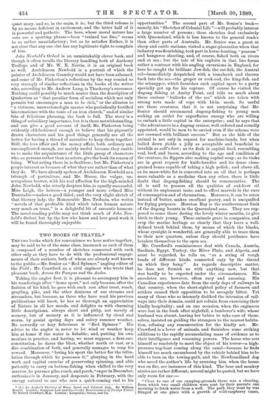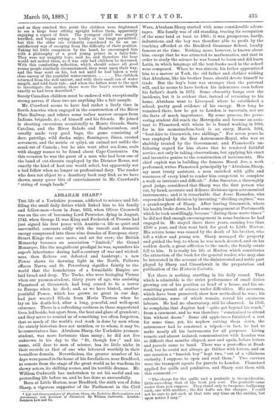TWO BOOKS OF TRAVEL.*
THE two books which for convenience we here notice together, may be said to be of the same class, inasmuch as each of them is composed of a number of sketches connected with each other only as they have to do with the professional engage- ments of their authors, both of whom are already well known to the public,—Mr. Senior as "Red Spinner," angling editor of the Field ; Mr. Crawford as a civil engineer who wrote that pleasant book, Across the Pampas and the Andes.
Taking the angler first, it is pleasant to accompany him in his wanderings after " home sport," not only because, after the fashion of his kind, he goes with such zest after trout, roach, grayling, pike, and the other denizens of our streams and streamlets, but because, as those who have read his previous publications will know, he has so thorough an appreciation of Nature in all her moods, and delights us with charming little descriptions, always short and pithy, not merely of scenery, but of scenery as it is influenced by cloud and storm, by genial spring days and sultry summer weather. No cowardly or lazy fisherman is " Red Spinner." His advice to the angler is, never to let wind or weather keep him at home if the water is fishable; and, putting his own maxims in practice, and having, we must suppose, a first-rate constitution, he dares the blast, whether north or east, or a dire combination of both, and generally manages to reap his reward. Moreover, "loving his sport the better for the tribu- lation through which he possesses it," glorying in the hard work and capital exercise of persevering spinning, and able patiently to carry on bottom-fishing when chilled to the very marrow, he pursues pike, roach, and perch, "eager in December, enthusiastic in January, and desperate in February, with the energy natural to one who sees a quick-coming end to his
• (1.) An Angler's Sketches of Home Sport and Colonial Life. By William Senior. London: Sampson Low and Co.—(2.) Reminiscences of Foresgn Travel. By Robert Crawford, M.A. London : Longman, Green, and Co.
opportunities." The second part of Mr. Senior's book— namely, his " Sketches of Colonial Life "—will probably interest a large number of persons ; these sketches deal exclusively with Queensland, which is less known to the general reader than other parts of Australia. Mr. Senior was a guest at sheep and cattle stations, visited a sugar-plantation when that industry was flourishing, took part in horse-hunting, " possum" and kangaroo shooting, and, of course, fished both on rivexs and at sea ; but the tale of his exploits in that line forms rather a contrast with his angling excursions in England, for here he caught the brilliant Jew-fish, the cat-fish, the Austral eel—immediately despatched with a tomahawk and thrown back into the sea—the groper or rock-cod, the king-fish, and the schnapper, which furnishes such capital sport to a party specially got up for his capture. Of course he visited the dugong fishing at Amity Point, and tells us much about these curious " bullocks of the sea" which are taken with strong nets made of rope with 14-in. mesh. So useful are these creatures, that it is not surprising that Mr. Senior should recommend dugong-fishing to young men seeking an outlet for superfluous energy who are willing to embark a little capital in the enterprise; and he says that " the adventurers in a dugong cruiser, well ordered and soundly appointed, would be men to be envied even if the scheme were not crowned with brilliant success." But as the hide of the animal is not only in request for machine-bands, but when boiled down yields a jelly as acceptable and beneficial to invalids as calf's-foot ; as its flesh is capital food, resembling veal, beef, and bacon, according to the age and condition of the creature, its flippers also making capital soup ; as its tusks are in great request for knife-handles and its dense close- grained bones capable of taking a high polish; and above all, as its snow-white fat is converted into an oil that is perhaps more valuable as a medicine than any other, there is little doubt that dugong-fishing should be remunerative. The oil is said to possess all the qualities of cod-liver oil without its unpleasant taste, and to effect marvels in the cure of consumption and of rheumatism. Moreover, it can be eaten instead of butter, makes excellent pastry, and is unequalled for frying purposes. Moreton Bay is the southernmost limit of the dugong haunts in the Queensland seas. They are sup- posed to come there during the lovely winter months, to give birth to their young. These animals graze in companies, and crop the marine herbage so closely that they leave a well- defined track behind them, by means of which the blacks, whose eyesight is wonderful, are generally able to trace them to their new quarters, unless they should perchance have betaken themselves to the open sea.
Mr. Crawford's reminiscences deal with Canada, Austria, Sardinia, Egypt, Turkey, the River Plate, and Algeria, and must be regarded, he tells us, " as a string of rough beads of different kinds, connected only by the thread on which they hang." As regards descriptive matter, he does not furnish us with anything new, but that was hardly to be expected under the circumstances. His anecdotes are, however, often racy and amusing. His Canadian experiences date from the early days of railways in that country, when the short-sighted policy of farmers and settlers caused their opposition to be savagely bitter. Yet many of those who so intensely disliked the intrusion of rail- ways into their domain, could not refrain from exercising their kindly hospitality; and on one occasion, when the engineers were lost in the bush after nightfall, a lumberer's wife, whose husband was absent, leaving her babies to take care of them- selves, insisted on guiding the strangers to the nearest habita- tion, refusing any remuneration for the kindly act. Mr.
Crawford is a lover of animals, and furnishes some striking additions to the rapidly accumulating mass of evidence as to their intelligence and reasoning powers. The horse who sets himself so resolutely to meet the object of his terror—a high- pressure tug-boat coming along the canal—because he finds himself too much encumbered by the vehicle behind him to be able to turn on the towing-path, and the Newfoundland dog who saved the author's life by arousing him when the house was on fire, are instances of this kind. The bear and monkey stories are rather different; several might be quoted, but we have only room for one :—
" Close to one of our camping-grounds there was a clearing, from which two small children were sent by their parents one morning to fetch water from a well. The path they went by was fringed at one place with a growth of wild-raspberry canes, and as they reached this point the children were frightened to see a large bear sitting upright before them, apparently enjoying a repast of fruit. The youngest child was greatly terrified, and began crying as loudly as his lungs permitted ; but this the elder one evidently considered to be an un- satisfactory way of escaping from the difficulty of their position. Taking his little companion by the hand, he encouraged him with a philosophy of a good young prince in a fairy-tale. They were not naughty boys, said he, and therefore the bear would not molest them, as it was only bad children he devoured. With this comforting reflection, which should solace all good young people similarly circumstanced, they went upon their way, and the bear went on his, but not until he had taken a very
close survey of the youthful water-carriers The children returned from the well unhurt, and with their small can of water nnspilt, and told their tale; and when the father went to the spot to investigate the matter, there were the bear's recent tracks, exactly as had been described."
Surely Canadian children must be endowed with exceptionally strong nerves, if these two are anything like a fair sample.
Mr. Crawford seems to have had rather a lively time in South America when engaged in the construction of the River Plate Railway, and relates some rather narrow escapes from Indians, brigands, &c., of himself and his friends. He joined in shooting excursions occasionally to Monte Grande, Santa Catalina, and the River Salado and Samborombon, and usually made very good bags, the game consisting of deer, patridge, wild ducks, snipe, flamingoes, ibises, crested screamers, and the nutria or quiyA, an animal not unlike the musk-rat of Canada ; but he also went after sea-lions, seals with shaggy manes to be found about Cape Corrientes. On this occasion he was the guest of a man who had been one of the band of cut-throats employed by the Dictator Rosas, not exactly the kind of host one would select, but apparently not a bad fellow when no longer on professional duty. The reader who does not object to a desultory book may find, as we have shown, many queer bits of entertainment in Mr. Crawford's " string of rough beads."



















































 Previous page
Previous page